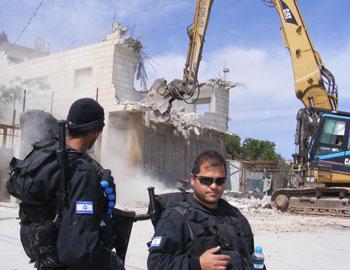

***************************************************************************
16 April 2009: Security forces demolish house of family of perpetrator of attack in Jerusalem
On 7 April, security forces demolished the apartment, in Zur Baher, East Jerusalem, of the family of Husam Dwiyat, who carried out a bulldozer attack in the center of Jerusalem in July of last year. The demolition took place after the High Court of Justice denied, on 18 March, the family’s petition opposing the action.

Demolition of the Dwiyat family’s house, East Jerusalem. Photo: Kareem Jubran, B'Tselem, 7 April 2009.
As in previous cases of this kind, the justices (Levy, Grunis, and Na’or) accepted the state’s argument that demolition of the family home will deter others from carrying out similar acts. The justices approved the demolition, even though the state never contended that Dwiyat’s family assisted him or knew of his plans.
From 1967 to 2005, Israel maintained a policy to demolish or seal houses in the West Bank and the Gaza Strip as a means to punish the families of Palestinians who had harmed Israelis. The policy was based on the claim that, out of concern for their families, Palestinians would be deterred from carrying out attacks. In implementing this policy, from October 2001 to the end of January 2005, Israel demolished 664 houses, leaving 4,182 persons homeless.
This practice is forbidden under international humanitarian law. The declared objective is to harm innocent persons – relatives of suspects – whom nobody contends were involved in any offense. As such, it constitutes collective punishment, which violates the principle that a person is not to be punished for the acts of another.
In February 2005, Defense Minister Shaul Mofaz and Chief of Staff Moshe Ya’alon accepted the recommendations of a team headed by Maj. Gen. Udi Shani, and decided that houses would no longer be demolished as punishment. The change in policy had a few causes, among them the determination that it is was impossible to state without reservation that house demolitions were effective in preventing terrorist attacks. In addition, evidence was presented to the Shani team indicating that house demolitions as punishment created immense hatred, which increased motivation to carry out terrorist attacks. In addition, it was determined by the committee that house demolitions adversely affected Israel’s public image around the world, and its legality under international law was unclear.
The judge advocate general, Brig. Gen. Avichai Mandelblit, explained at a meeting of the Constitution, Law and Justice Committee of the Knesset that the decision to cease house demolitions as punishment did not relate only to periods of calm, and that it would remain in effect also if terrorist attacks resumed. The JAG emphasized that the decision was sweeping, and that the subject would be reconsidered only in the event of a drastic change in circumstances.
Despite this, on 19 January 2009, without giving a convincing explanation, Israel renewed its policy and sealed two of four floors in the house of the family of the perpetrator of the attack at the Mercaz Harav yeshiva in Jerusalem, ‘Alaa Abu Dahim, in which his parents and one of his brothers lived. In that case as well, the High Court approved the state’s action.
********************************************************************************
B'Tselem welcomes the appointment of the jurist Richard Goldstone to head the fact-finding mission, called for by the UN Human Rights Council, to investigate the recent fighting in Gaza. Particularly welcome is the delegation’s mandate, which covers violations of international humanitarian law by both sides, in the Gaza Strip and in Israel.
B'Tselem believes that the delegation’s mandate and its composition provide the basic conditions necessary for an independent, fair, and credible investigation. However, the delegation’s success depends on the full cooperation of both sides. A balanced and objective investigation is clearly in Israel’s best interest. Victims of the recent fighting – Palestinians as well as Israelis – have a right to a remedy, including recognition of their suffering and accountability for those who violated their rights.
Toward this end, B'Tselem calls on the government of Israel to enable the delegation to enter Israel and the Gaza Strip. Also, Israel should provide the delegation with all relevant materials in its possession so that the members will have before them the considerations that guided the military in determining the targets that were bombed and the weapons that were used, as well as the orders given to the ground troops. Israel has made grave allegations regarding the combat of Hamas fighters. This evidence must also be provided to the mission.
Regarding Israel’s conduct, the delegation must investigate
- Whether civilian objects were the target of attack, even though the objects did not contribute to Hamas’s military actions
- Whether the army acted in accordance with the principle of proportionality, whereby it is forbidden to carry out an attack that is likely to cause injury to civilians that is excessive in comparison with the direct military advantage anticipated from the attack
- Whether soldiers fired at civilians without justification
- Whether soldiers used Palestinian civilians as human shields
- Whether ambulances and medical teams, while carrying out their medical duties, were attacked
- Whether there was delay in evacuating and treating injured persons in areas in which the fighting had ceased at the time
- Prohibited use of weapons, including white phosphorous
Regarding Palestinian forces, the delegation must investigate
- The firing of rockets at Israeli civilians.
- The firing at soldiers from inside civilian neighborhoods, endangering the lives of the residents.
- Storage of weapons inside civilian structures.
- Execution of Palestinians suspected of aiding Israel and political opponents
- Holding of Gilad Shalit as a hostage.
- whether Hamas militants forced civilians to serve as human shields and made improper use of ambulances and hospitals

هیچ نظری موجود نیست:
ارسال یک نظر